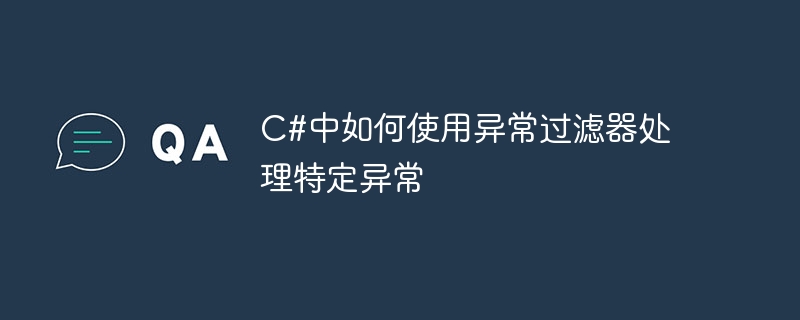

How to use exception filters to handle specific exceptions in C
#Exception handling is an integral part of the development process. When an exception occurs in a program, being able to accurately locate and handle the exception is one of the important links in ensuring program stability and reliability. C# provides an exception filter (Exception Filter) mechanism that can selectively handle specific types of exceptions according to needs. This article explains how to use exception filters to handle specific exceptions and provides some concrete code examples.
Exception filter is a new feature introduced in C# 6, which allows us to use if statements in catch blocks to further filter exceptions. Using exception filters, you can achieve more flexible exception handling and adopt different processing logic for different types of exceptions.
To use exception filters, we need to use if statements in the catch block to filter specific types of exceptions. The condition of the if statement can be any expression whose return value is bool type, that is, we can write the judgment condition according to our needs.
The following is a simple exception filter example:
try { // 可能会抛出异常的代码块 } catch (Exception ex) when (ex is DivideByZeroException) { // 处理特定异常的代码块 }
In the above example, we can see the when keyword after the catch statement, which is used to specify the conditions of the exception filter . In this example, we only handle exceptions of type DivideByZeroException.
Next, we will introduce how to use exception filters to handle specific exceptions through several specific code examples.
Example 1: Handling specific types of exceptions
try { int result = 10 / 0; // 除以0会引发DivideByZeroException异常 } catch (Exception ex) when (ex is DivideByZeroException) { Console.WriteLine("除法运算错误:" + ex.Message); }
In this example, we perform a division operation, and a DivideByZeroException exception will be thrown when dividing by 0. Then, we use the exception filter to filter only exceptions of the DivideByZeroException type and output the exception information.
Example 2: Handling Exceptions in a Specific Range
try { int[] arr = new int[5]; int index = 10; // 超出数组范围会引发IndexOutOfRangeException异常 int value = arr[index]; } catch (Exception ex) when (ex is IndexOutOfRangeException && ((IndexOutOfRangeException)ex).Index >= 0 && ((IndexOutOfRangeException)ex).Index < 5) { Console.WriteLine("数组越界错误:" + ex.Message); }
In this example, we have created an array of length 5 and tried to access the element at index 10 in the array. Because the index exceeds the range of the array, an IndexOutOfRangeException exception is thrown. Then, we use the exception filter to filter only exceptions of type IndexOutOfRangeException and whose index is within the array range, and output the exception information.
In addition to using a single exception filter, we can also use multiple exception filters to handle different types of exceptions, which can further improve the flexibility of the code.
Example 3: Handling multiple exceptions of specific types
try { // 可能会抛出异常的代码块 } catch (Exception ex) when (ex is DivideByZeroException || ex is IndexOutOfRangeException) { Console.WriteLine("捕获到特定类型的异常:" + ex.Message); }
In this example, we use multiple exception filters to handle two specific types of exceptions, DivideByZeroException and IndexOutOfRangeException. By using the "||" logical operator, we can handle multiple exceptions of a specific type simultaneously in a catch block.
Through the above examples, we can see that exception filters can help us handle specific types of exceptions more accurately. By properly using exception filters, we can write highly reliable and robust code.
To sum up, the exception filter in C# provides a more flexible exception handling mechanism that can help us handle specific types of exceptions. We can write corresponding exception filter conditions according to specific needs to achieve targeted processing of specific exceptions. Using exception filters can improve the reliability and robustness of your program.
I hope this article will help you understand the use of exception filters, and at the same time, you can apply relevant knowledge in actual development. I wish you write more stable and reliable code!
The above is the detailed content of How to use exception filters to handle specific exceptions in C#. For more information, please follow other related articles on the PHP Chinese website!




